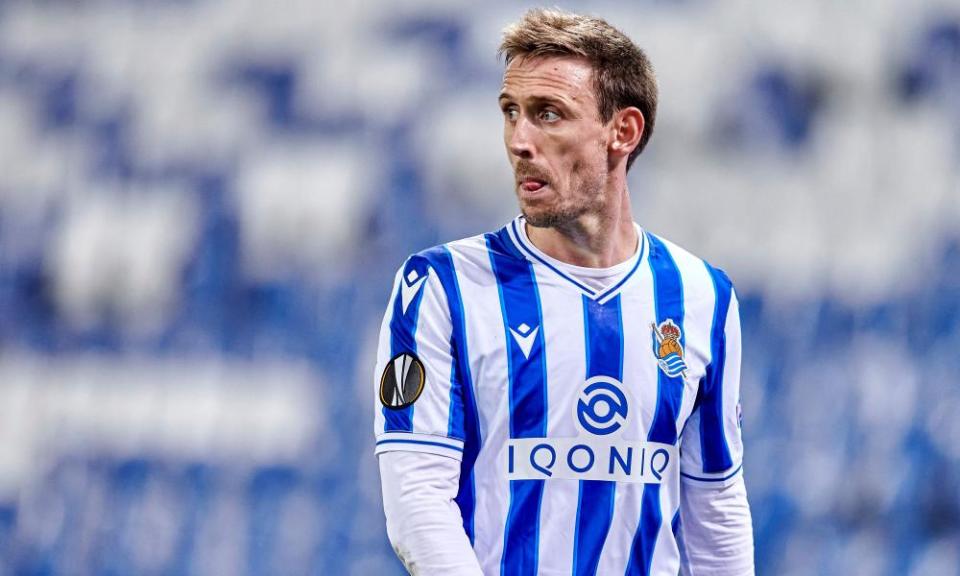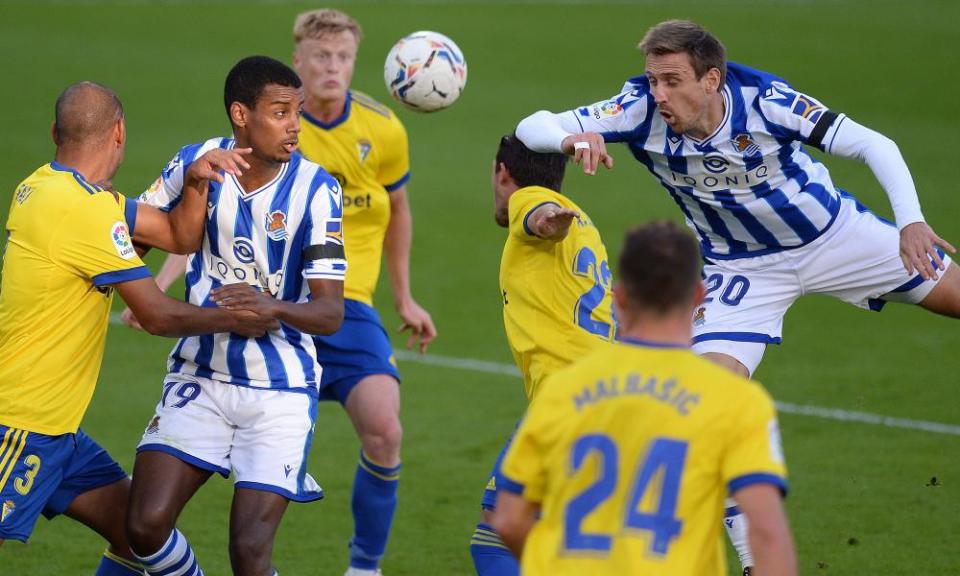Nacho Monreal: 'I’ve never been a star but I gave my all for Arsenal'

“I don’t know if he got a commission or something,” Nacho Monreal says and starts laughing again. “I woke up one morning to a call from Santi [Cazorla] asking me if I wanted to join. Imagine it: I was in shock, only just awake, not really with it. And by that night, I was an Arsenal player. I reckon the club said: ‘Santi, speak to Nacho: see what he thinks.’”
It was January 2013, deadline day, and what he thought, insofar as he had time to think anything, was that this was a one-off – an opportunity he couldn’t let pass by. As for Cazorla, if he got a commission it was worth it. A supposedly short-term solution, not planning to go anywhere that morning, Monreal spent seven seasons in London, played over 250 games and won three FA Cups.
Related: Milan sweat on Ibrahimovic injury after his double earns leaders win at Napoli
It happened fast. Now, having returned to Spain, he looks back on it all and forward to what lies ahead, even at 34. It’s not every day you talk to The Goat – yes, that really was his childhood nickname – which is a pity because, eloquent and open, Monreal has much to say: from pressure at Osasuna to Champions League robbery at Málaga, from La Liga to the Premier League and the Super League. Which, he says, “serves only to increase the gap, losing the essence of football”.
Most of all there’s Arsenal and Real Sociedad, starting with the signing Monreal never imagined and Arsenal hadn’t either until a torn hamstring led Cazorla to call. “Arsenal had two left-backs: Kieran Gibbs got injured two days before and André Santos wasn’t playing,” he recalls. “They were fifth or sixth and saw they might not qualify for the Champions League for the first time in [15] years so the idea of signing me formed. In a day, it was done.
“It was a leap: I’m from a tiny town, had never left [Spain], and went alone to a new country with a language I didn’t understand, where I hardly knew anyone. On my debut at Stoke there was a clash of heads, blood: a nice welcome to the Premier League. Sometimes, though, the train passes just once; climb on board or it goes by. Seven years later, I’m so happy I did.”
There was help along the way. Monreal talks warmly about Arsène Wenger, about Mikel Arteta, Héctor Bellerín and Cazorla, the “agent” who could play a bit. “At Arsenal fans love Santi because he was different, unique,” Monreal says. “No one in the squad could do the things Santi did.”
People loved Monreal too, although there is a hint of embarrassment when he’s told that. “I appreciate that, honestly,” he says. “I know what kind of player I am: I’ve never been a star who scores goals or makes the difference. But every time I pulled on the Arsenal shirt, I gave my all. I felt proud just warming up. You could feel the fans’ affection, gratitude. I’m very fond of them too.”
Over an hour Monreal talks, the physio waiting, and there is fondness in every word, laughter accompanying almost every line. He is a man at ease but not easing up – Real Sociedad await a cup final and lead La Liga, potentially his career peak saved until last.
Rarely is that fondness more apparent than when it comes to the FA Cup he won three times and the stadium where he won every medal he owns. He leaps to the competition’s defence, celebrating Spain’s decision to break from a “monotonous” model and finally adopt an English-style format. The “magic of the Cup” is no myth, he insists. But don’t we overplay it? Was it really that good?
“No,” he says. “It was much better. You wake on final morning, look out the window and five hours before kick-off there are people, flags, scarves, families everywhere. You get on the bus and they line the route. You reach the ground and it’s packed. 100,000 people. The way they live it is incredible, there’s nothing like it. The memories are marvellous. Just thinking ‘I’m going to play at Wembley’ is special … and if on top of that you win, what can I say?”
I can concentrate on the positive things. If you can’t handle the pressure, it can swallow you
He had come a long way, breaking through at Osasuna with Chelsea captain César Azpilicueta. “We’d never have imagined everything we’ve experienced,” Monreal says – something that’s underlined by a glimpse of vulnerability, of the obstacles overcome, as he discusses those early days.
“It’s always tough at the start, at least for me: at Osasuna, Málaga and Arsenal. I’m a very shy person, staying in my close circle. When you go somewhere new that timidity can be a problem. It was hard going from playing before 200 people, being anonymous, to 15,000. People talking about you. Feeling eyes on you in the street.
“You create a kind of invisible protective cloak. You’re just a kid. After many years it’s not a problem, which is why I’m enjoying it now – because it doesn’t affect me any more. I can concentrate on the positive things. If you can’t handle the pressure, it can swallow you. That happened in my first year; it ate me up. With every mistake, you hear someone whistle and sink a little. Thankfully I overcame it. Now I don’t hear anything.”
Well, of course not: there’s no one to have a go in these pandemic times. “Don’t you believe it,” Monreal replies, laughing. “There were fans in the Europa League. There was a 50-50, the opponent arrived late and hit me. I went down shouting. The fans thought I was exaggerating and every time I touched the ball: whistles, people shouting: ‘Monreeeeaal, you I-don’t-know-what!’ But nothing reaches me now, you treat it as a joke. Ten years ago, it would have sunk me.”
That journey has gone full circle, taking Monreal back to Spain seeking competition as well as comfort. San Sebastián is just 81km from Pamplona where it all began, although London hasn’t been left behind entirely. “Sometimes I find myself talking to teammates in English,” he admits. “Arsenal was wonderful but this is a new era. I’m near home, enjoying football. I talk to them a lot, especially Héctor: about the team, Covid, Mikel.”
Did you always see Arteta as a manager? “Yes,” Monreal says, fast. “You could see it. He was a leader, a captain. He expressed himself very well, spoke in every meeting, knowledgably. He communicated well. He was doing his badges, telling us his vocation was coaching. He was bright, tactically he understood, he grasped everything. That said, so fast? No. I didn’t expect that. But he will have learned with Guardiola. He’s brought fresh air and will grow more.”
It might have helped Arteta not to follow Wenger directly, Monreal thinks. “Wenger’s departure was controversial. There was a big divide among the fans, we saw it every game. After 22 years, the first post-Wenger coach was always going to have a difficult role. Maybe Unai [Emery] didn’t get the time he needed but he did a good job,” he insists.
“I would have loved to have played under Arteta. I spoke to Héctor about that. I had him as a teammate and I would have loved to see him as a coach; there’s that curiosity in me. But I chose another path and came to San Sebastián. I’m happy for me and him because things are going well.”
That’s an understatement. In Monreal’s first season, Real Sociedad were a revelation, reaching the Copa del Rey final – although a first Basque derby has been postponed until fans can attend, a decision from the clubs that he applauds. In his second, they’re top, playing superbly.
“When I signed, I knew the club, the players, and knew we would play good football, that we’d be high up,” he says. “But honestly, not this high. I encountered a better team than expected. In depth, this is probably the best squad I’ve been in. We’ve made a leap in quality this season.”

Signing David Silva helps. “I’d heard the club was working on a signing but it never crossed my mind that it could be David,” Monreal says. “One day I was flicking through the sports press: ‘David Silva signs for Real Sociedad.’ It was a shock. He’d been at City 10 years, the talk was of Lazio or leaving Europe. There are loads of places he could have gone.
“It was quick. Martin Ødegaard was going to stay: that’s what they’d said. But then Madrid decided to take him back. That hurt. We were left a little ‘orphaned’ by it, but the club handled it very, very well and above all very fast. In less than two days we’d gone from losing Ødegaard to signing Silva. You have to applaud that.”
And so, to the big question: can the former Arsenal and City players actually win La Liga together? “No one knows,” Monreal says. “Look, logically, the favourites are Madrid, Barcelona and Atlético. Ask anyone. But I saw Leicester win the league. Everyone said ‘they’ll slip away, they’ll slip away, they’ll slip away’ and they didn’t slip away.”
“It’s nice looking at the table but let’s see where we are tomorrow, what we’re fighting for in February, March. If we reach week 30 still up there, wonderful. And if so, us veterans will have a role to play. All that’s on our mind is to enjoy this. But one thing I’m clear about: we don’t fear any team; we don’t feel inferior to anyone.”

 Yahoo Sport
Yahoo Sport 





































